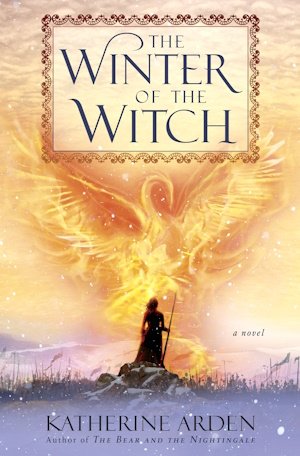Vasilisa—Vasya, Vasochka
Rodion—Rodya
Yekaterina—Katya, Katyusha
PATRONYMIC
THE RUSSIAN PATRONYMIC IS always derived from the first name of an individual’s father. It varies according to gender. For example, Vasilisa’s father is named Pyotr. Her patronymic—derived from her father’s name—is Petrovna. Her brother Aleksei uses the masculine form: Petrovich.
To indicate respect in Russian, you do not use Mr. or Mrs., as in English. Rather, you address someone by first name and patronymic together. A stranger meeting Vasilisa for the first time would call her Vasilisa Petrovna. When Vasilisa is masquerading as a boy, she calls herself Vasilii Petrovich.
When a highborn woman married, in medieval Rus’, she would exchange her patronymic (if she had one) for a name derived from her husband’s name. Thus Olga, who was Olga Petrovna as a girl, has become Olga Vladimirova (whereas Olga and Vladimir’s daughter is called Marya Vladimirovna).
GLOSSARY
BABA YAGA—An old witch who appears in many Russian fairy tales.
She rides around on a mortar, steering with a pestle and sweeping her tracks away with a broom of birch. She lives in a hut that spins round and round on chicken legs. In The Winternight Trilogy, she is Vasya’s great-grandmother.
BANNIK—“Bathhouse dweller,” the bathhouse guardian in Russian folklore.
BATYUSHKA—Literally, “little father,” used as a respectful mode of address for Orthodox ecclesiastics.
BELIYE—Porcini, a kind of mushroom.
BOYAR—A member of the Kievan or, later, the Muscovite aristocracy, second in rank only to a knyaz, or prince.
BROTHER ALEKSANDR PERESVET—Historically a monk and member of the Trinity Lavra under Sergius of Radonezh; he fought a single combat with Chelubey to open the Battle of Kulikovo. Both men were killed, but according to Russian sources, Chelubey was unhorsed first.
BYZANTINE CROSS—Also called the patriarchal cross, this cross has a smaller crosspiece above the main crossbar, and sometimes a slanted crossbar near the foot.
CAFFA—A city in Crimea, now known as Feodosia. In the era of The Winternight Trilogy, the city was under the control of the Genoese.
CATHEDRAL OF THE ASSUMPTION—Uspenksy Sobor. Also known as the Cathedral of the Dormition. Commemorates the dormition (aka falling asleep, aka death of the Mother of God and her being
taken to heaven). Located in the modern-day Moscow Kremlin, the original limestone structure was begun in 1326 and consecrated in 1327. The building presently on the site dates to the sixteenth century.
CHELUBEY—Called Chelubey by Russian chroniclers and Temir-Murza by his own countrymen, Chelubey was the champion for the Tatar side at the battle of Kulikovo. He was defeated by Aleksandr Peresvet.
CHERNOMOR—An old wizard and sea-king in Russian folklore whose name literally derives from “Black Sea.” With his thirty-three sons he would come out of the sea to guard the island of the swan-maiden in the fairy tale of Tsar Saltan.
CHYERTI (SINGULAR: CHYERT)—Devils. In this case a collective noun meaning the various spirits of Russian folklore. Another, and possibly better, term is nyechistiye sili, literally “unclean forces,”
but that is an unwieldy mouthful for Anglophone readers.
DAN—Tribute; in this case, the tribute owed by the conquered Rus’ to their Mongol overlords.
DED GRIB—Grandfather Mushroom. There is no historical source for this one; he was inspired by and is a shout-out to a character in the old Soviet children’s movie Morozko.
DMITRII DONSKOI—Called Dmitrii Ivanovich in The Winternight Trilogy, he earned the moniker “of the Don” following his victory at the Battle of Kulikovo.
DOMOVOI—In Russian folklore, the guardian of the household, the household-spirit. Feminized in The Winter of the Witch as domovaya. In some sources, the domovoi had a wife, called the kikimora, but I felt that feminizing the name of the main household-guardian was more appropriate for a witch’s house.
DVOR—Dooryard. The space between outbuildings in the property of a highborn medieval Russian.
DVOROVOI—The dooryard-guardian of Russian folklore.
ECUMENICAL PATRIARCH—The supreme head of the Eastern Orthodox Church, based in Constantinople (modern Istanbul).
GAMAYUN—A black bird in Russian folklore that speaks prophecy, generally depicted as a bird with a woman’s head.
GER (YURT)—A portable round tent made of felt or skins and used by Mongol armies on the march. Generally they were taken down and put up each night, but the finest one, used by the Khan or the leader of the host, was often left intact and transported from place to place on a giant platform drawn by oxen.
GOLDEN HORDE—A Mongol khanate founded by Batu Khan in the twelfth century. It adopted Islam in the early fourteenth century, and at its peak ruled a large swath of what is now Eastern Europe, including Muscovy.
GOSPODIN—Form of respectful address to a male, more formal than the English “mister.” Might be translated as “lord.”
GOSUDAR—A form of address akin to “Your Majesty” or “Sovereign.”
GRAND PRINCE (VELIKIY KNYAZ)—The title of a ruler of a major principality, for example Moscow, Tver, or Smolensk, in medieval Russia. The title tsar did not come into use until Ivan the Terrible was crowned in 1547. Velikiy Knyaz is also often translated as “Grand Duke.”
GREAT KHAN—Genghis Khan. His descendants, in the form of the Golden Horde, ruled Russia for two hundred years.
HEGUMEN—The head of an Orthodox monastery, equivalent to an abbot in the Western tradition.
ICONOSTASIS (ICON-SCREEN)—A wall of icons with a specific layout that separates the nave from the sanctuary in an Eastern Orthodox church.
IVAN—This reference is to the fairy tale Marya Morevna, where Ivan, having been cut apart by the wicked sorcerer, is restored to life by his brothers-in-law, the bird-princes, who go and get him the water of death (which restores his flesh) and the water of life (which returns him to life).

























